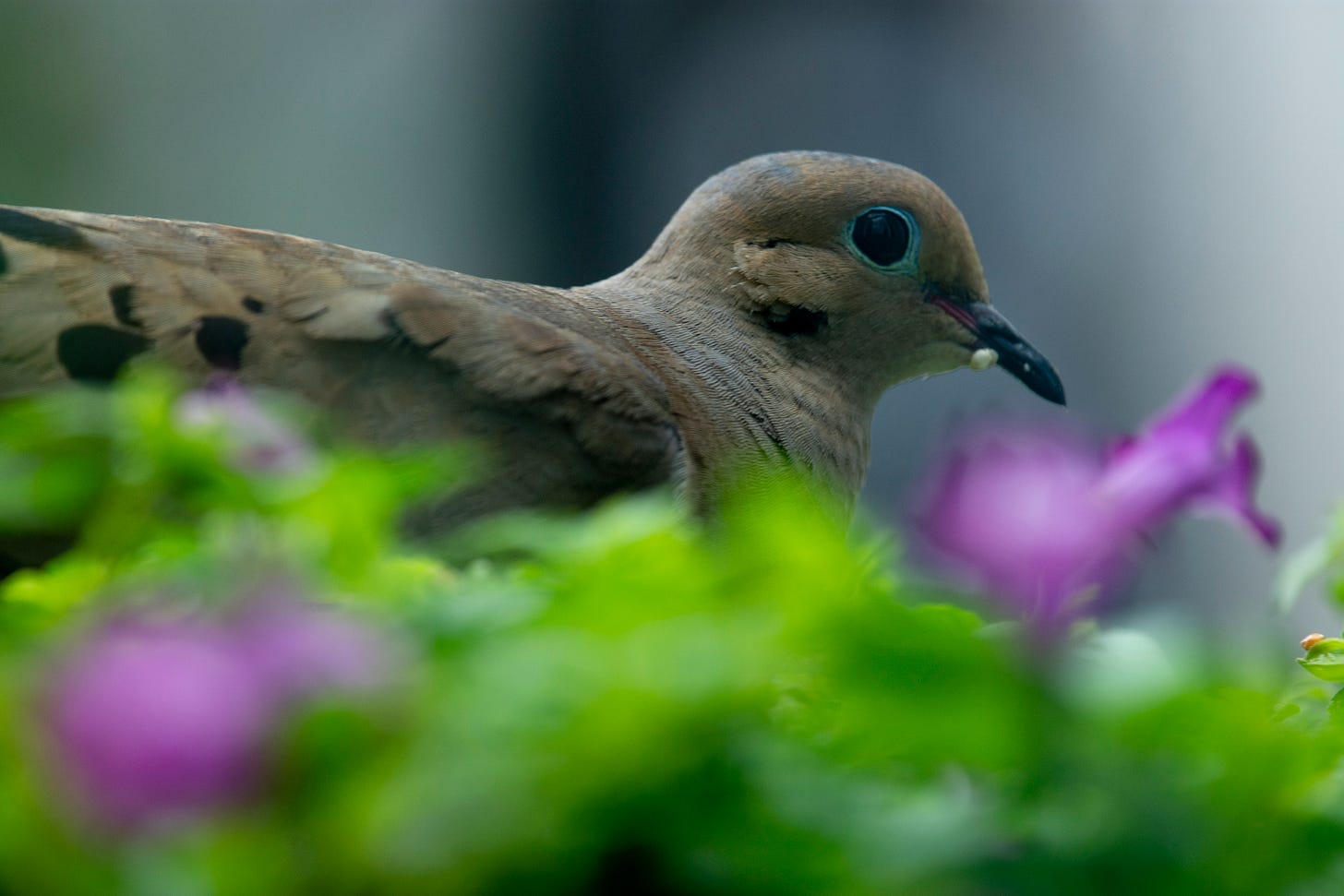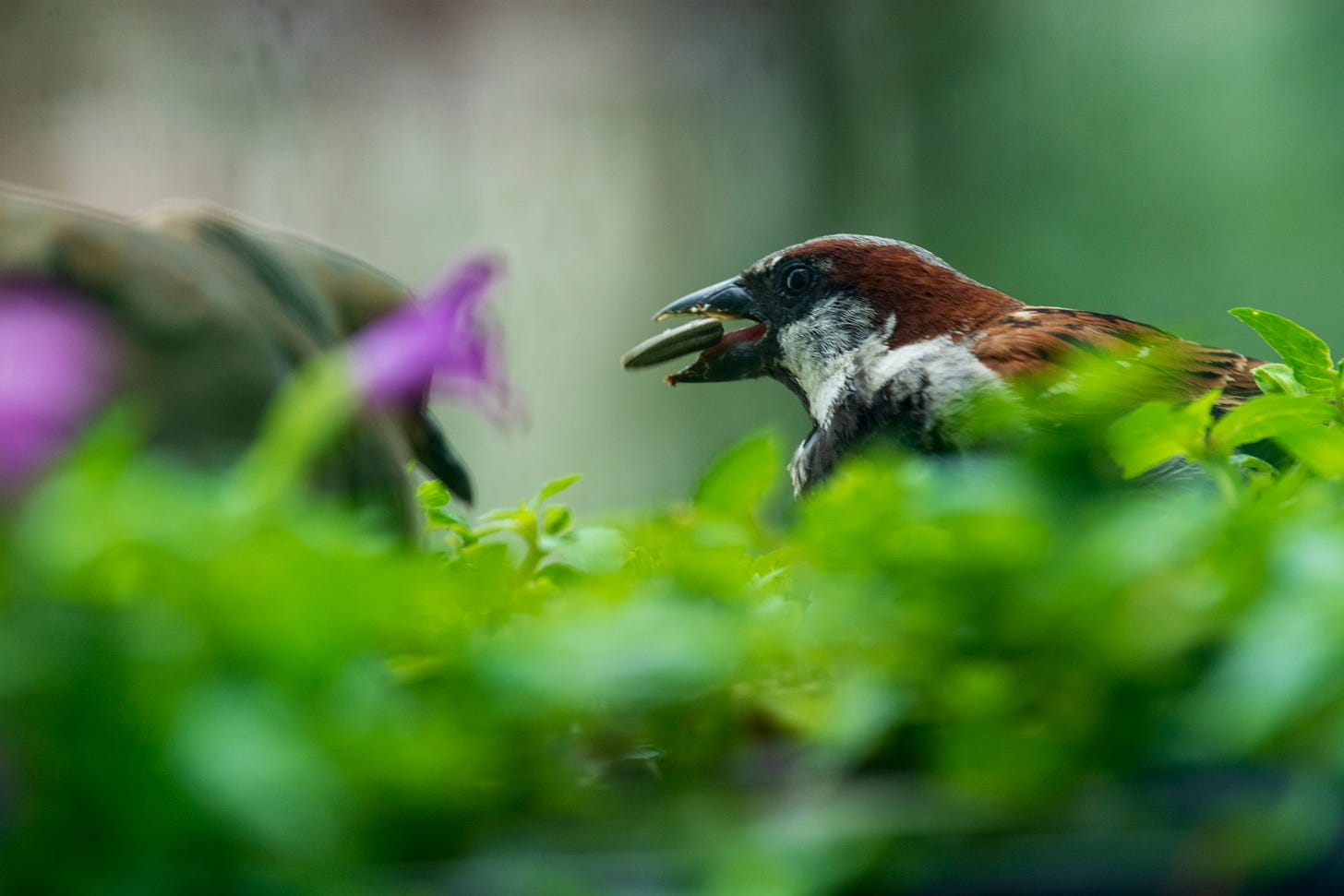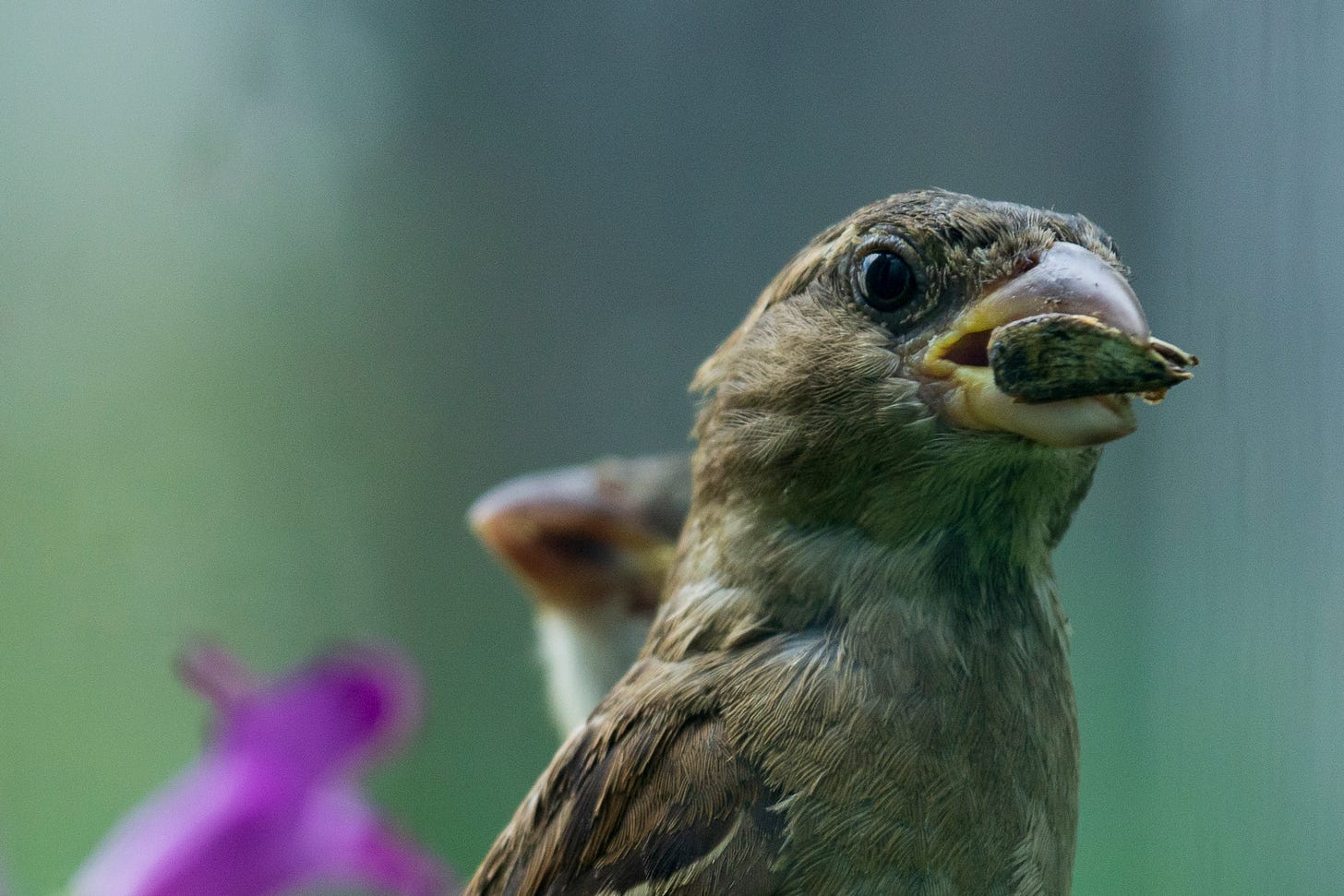Tapping Out
When I opened my shades this morning, a mourning dove was patrolling the railing. She’s demanding bird seed, and she’s almost certain I have some. She can probably see the old hot-and-sour soup container that I use to scoop out the seed, sitting out on my countertop.
If I hold out, she might throw herself against the window, or she’ll tap on the window with her beak. She’s letting me close enough that I can see the light green ring around her eye; it’s the palest shade of sea foam imaginable. I’m transfixed.
I wait for a few more minutes, and then give in. I sprinkle a minuscule amount of birdseed in the flower box and hope only a couple of birds will notice. Twenty minutes later, the dove has had her fill, and I have ten sparrows bickering, pulling the seeds out of each others’ mouths, flapping at each other from across the flower box. I have no idea how any flowers grow with all of this going on. I want to tell the sparrows to keep it down, but it’s useless. I have brought this on myself. I have been too tender-hearted. The birds have shaped me, tilted my behavior in their favor, just as I have tilted their behavior. We’re in a dance now, and I’m looking over their shoulder for someone, anyone to tap me out. It’s me, of course, who needs to stop the music. I can stop dancing whenever I want to, I think to myself, not very convincingly.
There are at least two reasons why I have to stop feeding these birds.
First, there’s a mysterious disease killing birds in the area — mostly grackles, blue jays, robins, and European starlings, but sparrows have been reported. It started in around DC and has spread out as far as Kentucky and Ohio, and the experts have asked bird lovers to clean their bird feeders and take them down, so that birds don’t congregate and spread disease.
Second, after a year of feeding the birds with no problem, my apartment complex sent out this email:
We ask that bird feeders are not hung off of windows or balconies, as they have recently caused a significant increase in birds defecating and leaving bird seed in the Courtyard. This is where residents enjoy spending time working, eating, etc. and we want to make sure it is clean and tidy for everyone to utilize.
I can’t really blame them. The birds must have been starving, since everyone in the city took down their feeders all at once, and because at first the mystery disease wasn’t affecting the sparrows or doves — the only two birds I ever got — I initially kept mine up, and that’s when things got out of control.
Endless flocks of sparrows swooped into the courtyard, where they fought loud, aerial battles over seed, lost feathers, sent out calls to their friends, munched through the seed at tremendous speeds, demanded refills, and threw themselves at my windows. The poop was tremendous. I thought that maybe I was entertaining everyone’s pets for free, and that might hold off the complaints, but I guess it wasn’t enough.
Truth be told, it shouldn’t have been enough. I knew things were out of control. The mystery disease had now spread to house sparrows, and the overcrowding at my feeder made it an easy breeding ground if just one sick sparrow appeared, no matter how much I cleaned. It was time to take down my feeder too.
I took it down late at night, while the birds were asleep. I waited a few days. The birds dispersed, as I had been told they would. And then I thought, Malka — my cat — looks so lonely, so bored. What about a little birdseed? Just in the flower box.
And here we are again.
I know the neighbors will complain. I know I need to stop.
What worries me the most about the way I am behaving is how human it is. I shape my landscape around me, moulding it, changing it. If the birds were a bear, the bear would have to be removed after its interaction with me, put into some back country where it could forget to associate humans with food. In general, it’s not a great idea for animals to associate humans with food. That’s how they end up begging for food from the wrong person and getting killed, getting hit by cars, and other terrible fates.
Maybe it’s not so wonderful that my feeder, and my flower box, are so close to my actual living space; that the birds can see me in it; that the dove knows the hot-and-sour soup container that I use for birdseed. Maybe they know my different pajamas. For sure, they know my weekends, when I get up later, versus my weekdays. And they absolutely know Malka-the-cat, and that, no matter how many times she charges the glass, she’ll never get them. You can almost hear them chuckle when she tries.
I’m reading Are We Smart Enough to Know How Smart Animals Are? by Frans de Waal, which describes myriad experiments done to try to suss out how smart all kinds of different animals are. I think some of my favorite experiments, though, are the accidental ones that show how stupid — or maybe just myopic — humans can be.
In one, almost all the experimenters — all men — were getting one result from the animals, but the last scientist — the only woman — got a strikingly different result. Fortunately, rather than excluding her results as “outliers” or concluding that she didn’t know what she was doing, they looked into it and realized that she was *shorter* than all the other scientists, and, given the position of the animals’ cages, the animals couldn’t see her. She was therefore the only experimenter who was observing the animals’ reactions without them knowing that they were being observed — and it changed their behavior significantly.
I know the birds aren’t starving. I realize they have other food sources. But the birds are reacting to me, and to some extent, they experiment on me: they see if they can change my behavior.
They’re pulling on my very human heart, they know how easy it is for me to change the natural environment for our mutual short-term pleasure, how easy it is to think nothing of the bird plague (that may never hit these birds specifically!), or my neighbors (heck, I’ve lessened the number of birds coming to visit, isn’t that enough for you people?). And I’ve got to tell you — the dove’s light green eye ring, I would do almost anything for it.
But that’s not the kind of human I want to be in nature. I want to be like that woman scientist — so out of the range of animal eyesight that they act as if I weren’t there. It’s impossible, really — I’m a Goliath in so many ways, I enter the equation having already changed nature almost out of recognition, and yet each new interaction is another opportunity for quiet observance, for shortness, for tapping out of the dance, standing on the sideline, and catching my breath in awe at the dove’s wings as they whistle and whir away from me.
Speaking of tapping out … I’m going to have a friend in town next weekend, and after that, it’s going to be all-hands-on-deck getting ready for the trip out to the Grand Tetons & Yellowstone. My updates might not be as regular for a while, but I’m hoping to do a few quick updates when I’m out West in early August, and then I’ll do a trip summary when I return.
Feel free to email me at info@WanderFinder or follow me on Twitter @WanderFinder for more updates or just to chat.
Hope y’all have a great rest of the summer with lots of fun (short-scientist) animal encounters. :)






A gripping read as always. May the birds recover. I'm still seeing jays and grackles around the house. We don't feed them, but they find plenty of bugs in our grass.